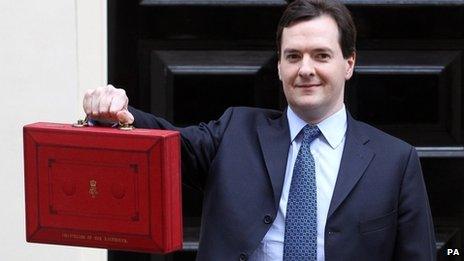Behind the Budget challenge
- Published

George Osborne will be opening the box this week
George Osborne faces a mighty political task with his Budget on Wednesday; to prove he's the man with the plan, and to recover some reputation for competency following the 'omni-shambles' Budget this time last year.
There's a public finance component as well, of course, as he has to adjust to new forecasts, almost certainly putting him further off track, and probably showing the deficit going in the wrong direction.
He's looking at a spending envelope which is making the coalition parties' 2015 re-election prospects look very difficult. The topline figure this week will spark new tensions between Whitehall spending ministers in the run-up to the June 26 spending review.
There's the economic objective as well, trying to get growth going, despite the austerity measures. And to do that, he surely has to pump some confidence into business boardrooms, to get them investing once more.
Zombie firms
To make up for the shortcomings of stagnating demand from domestic and government sectors, and if Scotland is to reach a modest 2% growth rate, it's reckoned Scottish investment needs to grow by 8% per year - nearly double the UK growth rate being forecast.
Yet far from investing, there remains a significant number of companies in 'zombie' mode - those unable to pay more than the interest on their debt, and only being kept alive by either low interest rates or the forbearance (for now) of their banks.
In Scotland, it's thought that 11% of companies are in that position, including 20% of those in the hospitality sector.
That calculation is included in a new analysis by the Scottish Government's chief economist, Gary Gillespie, setting out the scale of the task in getting the economy going again.
His upsums of economic conditions include some interesting insights, from bringing together known data and delving into the lesser known stuff.
Despite the headed notepaper, they are mercifully free from political topspin.
On jobs, for instance, this latest analysis includes an insight into the extent of under-employment in Scotland - those working shorter hours than they want, or under-using their skills, as with graduates making coffee. This shows 10.3% of workers classified as under-employed between 2009 and 2012, up from 7.4% before the crunch.
Under-employment affects women and young people more. It's an issue for more than a fifth of part-time workers. And by the end of last year, Scotland's incidence of it was slightly lower than the UK level.
Micro-business
Dr Gillespie's analysis shows self-employment has increased sharply, to more than 12% of Scots in employment. For comparison, the UK rate is 14% and London's is 18%.
The biggest growth in self-employment was in 2011-12, and it may be no surprise to find it was steepest among men (nearly two-thirds of the increase) and among those aged 50-64.
That ties in with a marked increase in the number of very small companies, often one-person bands.
The figures explain a lot about job and company creation across the British economy. Since 2007, there was a sharp increase in the number of Scottish enterprises with no employees, accelerating between 2011 and 2012.
Measured across the UK, the number of micro-enterprises between 2000 and 2012 was up 38%.
Partly, this is down to 'contractorisation'. That can be employing workers on day rates, with little stability or security, though it can be more positive than that, appealing to employers and the self-employed person by offering flexibility.
This can result from people losing their jobs, and either they set out with a dream of being their own boss, or they declare themselves self-employed out of desperation because salaried jobs are so rare, and they want to look busy.
In construction, all three explanations could help explain the 26% increase in the number of micro-businesses between 2010 and last year.
Start-ups stalled
So which is it? What is the main motivation behind the self-employment boom? Dr Gillespie cites evidence from the Small Business Survey carried out last year, showing 46% of new-start business owners were motivated to start up a business because they could see a market opportunity. Some 29% said it was because here were no other choices for work, and 25% said it was down to a combination of opportunity and necessity.

Hotels and catering businesses have struggled to survive the downturn
That backs up, to some extent, evidence for the Global Entrepreneurship Monitor carried out for Strathclyde Business School, showing Scotland's persistently low start-up rates are showing signs of closing the gap with the rest of Britain.
But do these small companies survive for long? The survival rate of companies created since 2006 has fallen, as you might expect. For those started in 2006, 96% survived at least a year, but that's down to 86% - a similar fall to that across the UK. Five-year survival for those starting in 2006 was 46% in Scotland, and slowly lower across the UK.
And there's lots of variation within those figures. Hotels and catering has only 36% survival over five years, whereas it's 60% for health. Orkney, though with small numbers, could boast 67% five-year survival, but only 38% of 2006 start-ups in West Dunbartonshire were still going in 2011.
Growth target
Those are just a few elements of the economic backdrop to imminent Budget decisions. But they're important in helping contribute to the view of Dr Gillespie that the weak outlook for the Scottish economy is less to do with external factors this year.
He was writing before the Cypriot savings raid threatened to de-stabilise the eurozone once more. But he argues that an easing of the pressure from the debt overhang could help to boost business confidence and get investment moving again.
The conclusion: getting back towards trend growth by the end of 2014, as well as returning to pre-recession levels of output close to the end of next year.
Of course, that would coincide with the referendum on independence, for which we'll get a date later this week. If Dr Gillespie is right, it's for his ministerial bosses to make use of the political consequences.
You can hear Business Scotland at 6am on Saturday 16 and 10am on Sunday 17 March, BBC Radio Scotland, and after then, by free download http://www.bbc.co.uk/podcasts/series/scotbiz and on BBC iPlayer.